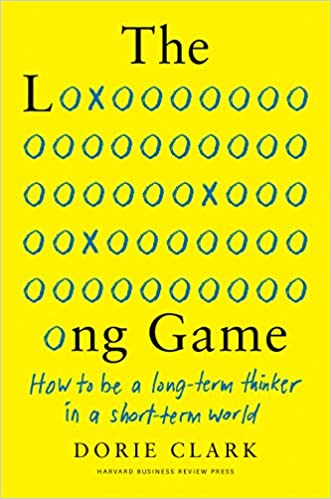You have /5 articles left.
Sign up for a free account or log in.
 The Long Game: How to Be a Long-Term Thinker in a Short-Term World by Dorie Clark
The Long Game: How to Be a Long-Term Thinker in a Short-Term World by Dorie Clark
Published in September 2021
Is it just me, or are you also seeing a spike in nonfaculty educators leaving their university jobs for roles outside the academy?
Across my networks of learning designers, educational technologists and digital educators, I see a trend toward career pivots.
In surprisingly large numbers, alternative academics and digital learning professionals seem to be taking jobs at online education platform companies, online program management providers and ed-tech providers.
All these career transitions out of universities were on my mind as I read Dorie Clark’s new book, The Long Game: How to Be a Long-Term Thinker in a Short-Term World.
Clark is a well-known speaker, writer and career coach. While not an academic, Clark has guest lectured at numerous universities.
Clark’s big argument in The Long Game is that professionals tend to overemphasize short-term career gains while underinvesting in long-term goals. Her point, illustrated through a synthesis of some academic research and much anecdotal storytelling, is that we can accomplish much more across long-term time horizons than we realize.
Setting career goals for the year ahead (the thing we do in annual reviews) is fine, but the real effort should be invested in setting five- and 10-year professional goals.
As a traditionally trained social scientist, I kept wanting to see the data to test Clark’s hypothesis around the efficacy of prioritizing long-term career objectives. Where are the longitudinal studies that track self-reported attitudinal indicators against long-term occupational outcomes? The stories that Clark tells are plausible, but what if they are just that—stories?
If you are thinking about making a big career move, my advice is to retain your skepticism but open up your mind to the possibility that Clark might be on to something.
Reading The Long Game should be helpful to you as you think about your options both inside and outside higher ed.
As you evaluate if you should apply for that job at another university or at a company that works with universities (as many of you are), try not to focus only on the short-term benefits (or downsides) of a new role. Instead, get clear with yourself about career goals five and 10 years from now. Ask yourself where you want the broader impact you hope to have through your work, and then try to determine if that new opportunity will enable a path toward those goals.
Another theme of The Long Game that I think may make the book especially relevant to nontraditional academics is Clark’s focus on the importance of developing “recognized expertise.” The book has many good strategies to begin and sustain the process of building and evolving a professional reputation.
At this moment, spending the energy required to think long term about our nontraditional academic careers may seem like too heavy of a lift. We are all exhausted by the never-ending improvisation of navigating our higher ed work during this stage of the pandemic. A stimulating, thought-provoking and relatively untaxing read such as The Long Game may be just what we all need to help us all think about our careers over the years and decades to come.
What are you reading?








